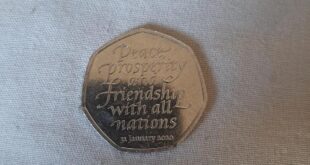American businesspeople tend to view Europe as a single market with like-minded consumers and cultures. But Rasmus Cort knows better. His company, Sorry Mom, sells tattoo ointments and lotions throughout the continent. I asked him how a U.S.-based company can succeed there.
“If I were an American,” he told me, “I would focus on the English-speaking markets, such as the U.K. If you wanted a business in Germany, for example, you need a German branch. The same goes for France. Certainly residents of Germany and France speak English, but it doesn’t mean they will buy American products and services.”
Sorry Mom is one of two companies that Cort owns. The other, Iron & Ink, is a tattoo studio with three locations in Denmark and a fourth in Los Angeles, U.S.
He and I recently spoke about European commerce, tattoos, and the challenges of running two businesses. Our entire audio conversation is below. The transcript has been edited for clarity and length.
Eric Bandholz: Tell us about yourself.
Rasmus Cort: I’m 30 years old. I live in Denmark. I own two tattoo businesses. One is called Sorry Mom. It develops and sells tattoo skincare products. We started seven years ago with one product and purpose: to develop the best healing ointment for a new, fresh tattoo. We called it Sorry Mom Tattoo Balm. It’s still our bestseller. Now we have seven additional products in the Sorry Mom brand.
Sorry Mom arose from a side project while I was hanging out in a tattoo studio called Iron & Ink. I met the owner, and we became friends. I’m now a partner and co-owner of Iron & Ink.
Sorry Mom sells products worldwide, although mostly in Europe. We’ve just expanded Iron & Ink beyond Denmark to Los Angeles, where we opened a new studio last October.
That’s three Iron & Ink locations in Denmark and one in Los Angeles. We’re opening a fourth Denmark location soon in Aalborg, one of the largest cities in the country. We’re looking to add another one in Denmark in January, hopefully.
Bandholz: I tend to have an American bias in this show. Most of the people I know are Americans. What it’s like to do business in Europe? What is that mindset? How does an American company find success there?
Cort: Europe is different than America. And Denmark is different from much of Europe. Denmark is a small country — a population of 5.5 million. The country is very regulated. We have one of the highest tax rates in the world, nearly 50 percent. The value-added sales tax is 25 percent.
It’s difficult to build a huge business in Denmark. But we also have a vast welfare safety net and many resources to help get a business up running.
Bandholz: We tried to generate sales from Europe for Beardbrand. We learned many lessons. The biggest was what you just addressed. Americans tend to think of Europe as a single market. But that’s not the case.
Cort: Europe is so many things. It’s difficult to conquer at once. It’s a collection of small countries and small markets and different languages. Plus, we have countries that aren’t even a part of the European Union.
But there is a big opportunity within the E.U. with the free movement of products and services — no taxes or duties on products that go from one E.U. country to another. It’s similar to the United States, selling goods across states.
Again, not every country in Europe belongs to the E.U. Norway does not, for example. And the U.K. is leaving later this year. In other words, there are different markets to target.
If I were an American, I would focus on the English-speaking markets, such as the U.K. If you wanted to establish a business in Germany, for example, you need a German sales office or branch due to the language. The same goes for France. Certainly residents of Germany and France speak English, but it doesn’t mean they will buy American products and services.
We experienced this for Sorry Mom. We’ve been an English-speaking brand, so to speak, since day one. But we sell the most products in the United Kingdom and Denmark. So the language barrier is real, even though most Europeans speak and read English.
Bandholz: So your packaging is in English and Danish.
Cort: No. Everything is in English. The Danes overall are highly educated. Everyone speaks English fluently.
Bandholz: What about France and Germany? Has Sorry Mom gained traction in those countries?
Cort: We do have a bit of traction in Germany. But that happened only when we started working with a German distributor. We have tried several marketing campaigns to sell directly to consumers, as well as directly to German tattoo parlors. But again, language is the hurdle. It’s more important than one would imagine in 2020.
We have no business, essentially, in France. We sell to just four or five tattoo studios there.
Interestingly, Romania is one of our biggest markets in Europe. But, again, that’s because we work with a sales rep in Bucharest who also does graphic design for us.
You need people on the ground if you want to break down these barriers. Certainly you can build a direct-to-consumer brand and business in English from anywhere. But our focus at Sorry Mom has always been to combine DTC sales with strong relationships in the tattoo community — the tattoo studios — to stock our products. From there, we can generate more traffic and more DTC sales.
Bandholz: I didn’t realize many of the cultural differences between Europe and America. For instance, “credit” is a dirty word in Germany, more or less. Very few consumers use a credit card there.
Cort: True. Look at shipping, too. Pretty much all of the European countries have their own national postal service. We have Post Danmark, which is Danish Post in English. The U.K. has Royal Mail. Plus there are many independent shipping companies in each country. We have the big players — UPS, DHL — but a lot of consumers are not as familiar with those companies. I doubt that UPS will ever compete successfully with the German postal service, which everyone in that country uses.
Bandholz: Speaking of shipping, you’re opening your own fulfillment center.
Cort: Yes. We had fulfillment partners in Denmark and the U.S. But being hands-on with orders improves how we package and represent our products and how customers receive them.
We’ve learned that it’s difficult to find fulfillment partners who deliver the kind of service we desire. So we analyzed our costs. We calculated that we could rent a warehouse that fits our current needs and 50 percent more at the same price we pay now to those partners.
That means, of course, that we have to hire people to do the packaging and fulfillment. But, again, it also allows us to do more, such as inserting handwritten notes in the orders or sending samples, which is critical for wholesale orders.
Bandholz: Let’s segue. How do you run two businesses, Iron & Ink and Sorry Mom? One is service-based. The other sells products.
Cort: I get asked that question frequently. The simple answer is I love what I do. Plus, both businesses are in the same industry. I have employees. So I’m not alone. I always have someone to help when needed.
For me, it’s a perfect combo. With the studios, I’m not doing tattoos. But I get to work with a lot of people. I like that.
In the Sorry Mom business, I work with products and with scaling a business without actually hiring more people. I focus on automation, growth hacks, new systems, customer management software, ecommerce marketing. That’s what I’m passionate about.
For me, running the two companies is the perfect job.
Bandholz: How can people contact or follow you?
Cort: I am on Instagram, Rasmus Cort. I’ve just launched a YouTube channel. Sorry Mom’s ecommerce site is SorryMomShop.com. Sorry Mom and Iron & Ink Tattoo both have an Instagram page. Iron & Ink also has a YouTube channel in Danish.



